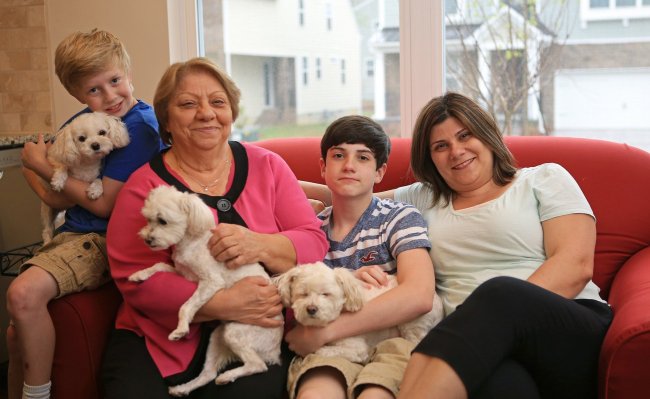CHARLOTTE, North Carolina ― When Alenoosh Kohl travels to her mother’s home, she doesn’t have to get into her car and take the interstate. She’s just one door down the hall.
Living in a home designed specifically for multigenerational families, Kohl, 44, and her mother Anna, 67, each have private residences under one roof: separate living rooms, kitchens, bedrooms, bathrooms and even laundry rooms.
“We have the convenience of her being with us, because she wants to be part of our lives, and it makes me feel at ease that if she ever needs help we’re here to help her,” said Kohl, who lives on her side with sons Colin, 13, and Yuriy, 11.
Called granny flats throughout much of Europe, where multigenerational living is already part of a large trend, the home-within-a-home concept is starting to become a popular housing design in the United States as well.
For homebuilders, it’s a small niche market that’s growing bigger each year. A Pew Research Center study estimated that today 51 million Americans live in homes with more than one other adult generation.
The reasons are multiple, but often lead back to finances. Older grandparents may move in to ease the cost of child care. A son or daughter may take in a parent as a more feasible alternative to paying for the cost of assisted living or a nursing home.
 |
| Yuriy Kohl (from left), Anna Bedrosian, Colin Kohl and Alenoosh Kohl sit in Bedrosian’s apartment, which is built inside of her daughter Alenoosh’s “Next Gen” home, designed for multigenerational households. (Charlotte Observer/MCT) |
The saggy economy of recent years has also left a portion of boomerangs ― adults aged 25-35 who are unable to find work after graduating from college ― back on mom and dad’s doorstep.
Other families have found multigenerational living suites a good way to foster independence in adult children with disabilities such as autism or Down syndrome.
Kohl chose a house design that would allow her mother the privacy of her own space.
“We thought it was the perfect fit,” said Kohl, who moved into a Next Gen home by Lennar in the Lawson community in Waxhaw, North Carolina, last August. “It makes her feel like she has her own home.”
The designs have a first-floor private suite that includes a living room, bathroom, bedroom, laundry room and a kitchenette with a convection microwave, dishwasher, sink and a refrigerator as an option.
Each suite has a separate HVAC zone and its own programmable thermostat, a tandem garage and a private entrance with its own doorbell.
Lennar offers four designs ranging from 3,101 to 4,058 square feet and prices from $253,780 to $386,640.
Sometimes circumstances change and a home within a home is either no longer needed or could be better used for a different purpose. Classica Homes has come up with a blueprint for spaces that can be adjusted.
Classica’s Flex-Gen design, modeled after the setups in luxury yachts, has a layout that makes it easier to convert an in-home suite for other uses.
“You can remodel it literally in a weekend by taking out a wall and bingo, you’ve got a formal dining room again,” said Bill Saint, President and CEO of Classica Homes.
Flex-Gen designs also have separate HVAC zones as well as soundproof walls between the two residences. There are two floor plans, ranging from 4,300 to 4,600 square feet, with suites around 500 square feet. They’re priced from $530,000 to $540,000.
For those whose parents may not be able to live independently, medically enhanced cottages may be an option. MEDCottages by N2Care, designed at the Virginia Tech Corporate Research Center, can be placed in a caregiver’s backyard, with electricity and water hooked up to the main home. The homes have a kitchenette, bedroom and bathroom, as well as floors that absorb 38 percent of a fall, cameras that monitor 45 centimeters from the floor to ensure privacy and a lift system to assist a caregiver in moving a person.
“We were trying to give people options that didn’t currently exist in our culture, apart from nursing homes and institutional living,” said Dr. Ken Dupin, founder and CEO of N2Care. “A MEDCottage costs $60,000, which is about one year in a nursing home.”
Two floor plans are available: a 29-square-meter cottage for one person, and a 56-square-meter design for two. Check with your local zoning board to learn about restrictions that might apply when adding a residence.
By Lisa Thornton
(The Charlotte Observer)
(MCT Information Services)

